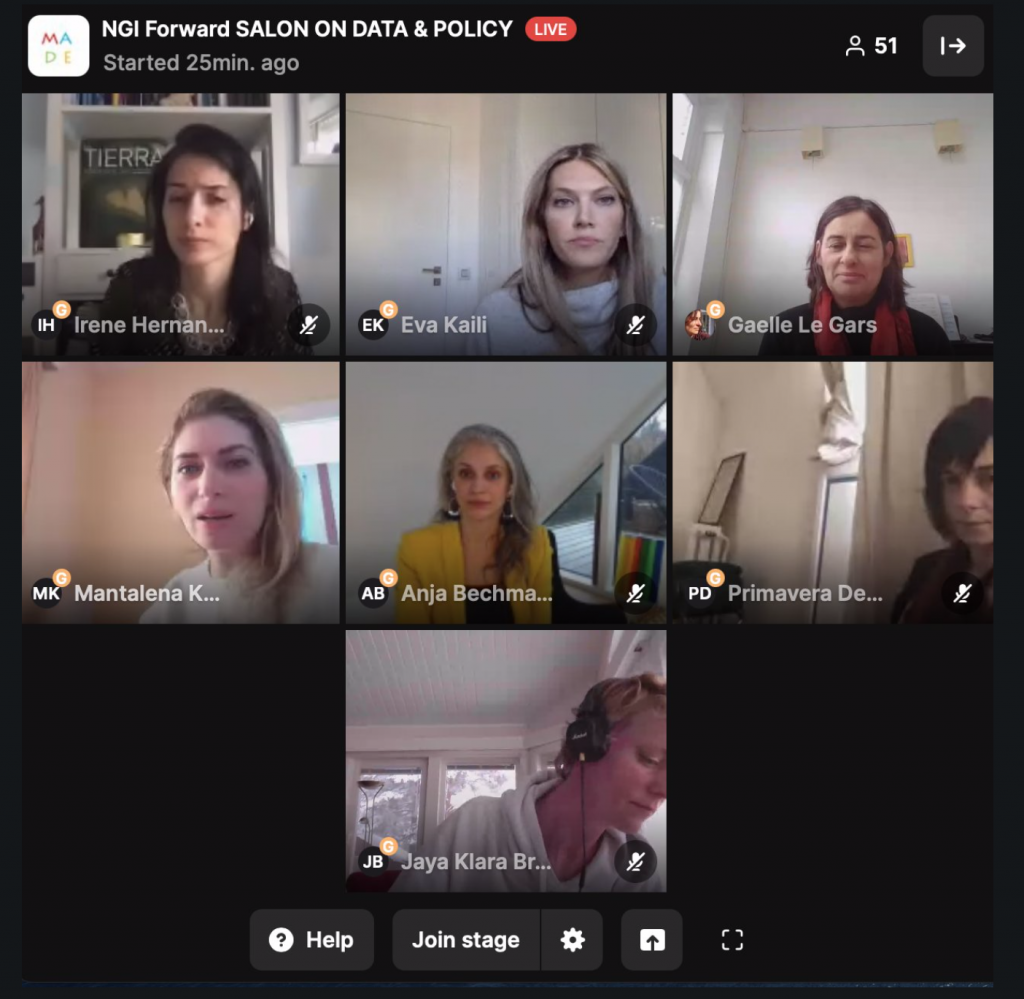NGI Forward SALON ON DATA & POLICY
date 20- jan 2021: 11:00 CET
Notes taken by fredd at the NGI SALON Event organized by Rob Van Kranenbourg. A all female, very high level and clear panel discussion.

Data Policy
- Prof Anja Beckmann; DATALAB Aalrus University, DK
- Study of Facebook and other data sources on social media; Data and Policy
- case history: Cambridge Analytics, third party trackers. Systemic Discrimination, hate speech etc.
- Main focus Disinformation and conspiracy theories: Big Tech has to be brought out to society; science for people available on a larger scale. How to do this without violating privacy. How to construct such solution.
- Same API for business and for Academics was the policy before Cambridge Analitica. The API should be different.
- Why is important to have science for Society? If we argue only from privacy POV we can in principle we cannot detect the breaches.
- We have no visibility on the “secret groups” as Facebook has, we cannot actually protect privacy in a good way (a paradox)
- Conspiracy and Disinformation is dangerous
- two types of disinformation are especially interesting: disinformation and bad science
- how to detect discrimination if we don’t have access to data?
- Hate Speech: Data transparency and algorithmic transparency.
- NOTE IS MINE We should know both. But platform algorithms are secret.
- Study of Facebook and other data sources on social media; Data and Policy
- Irene Hernandex – CEO Gataca
- Data interoperability. CEO and founder of Gataca Decentralized Identity Technology, to transfer the ID to the final consumer
- is a very complex ecosystems: citizens and companies ($$)
- Governments, financial etc. already working on DLT tech for this
- data interoperability was a mess (governance, data models, isolated tools for issuers and verifiers)
- How to ensure interoperability?
- focused on verifiers (strong vendor lock in situation)
- different translators for this interfaces. Complex interfaces and a complex credential handling systems
- constantly new providers come into the scene
- effort to standardize this interfaces? We went to a open universal standard. VUI Verifier Open Protocol first draft
- how to work together as a community?
- Jaja (cobox)
- part of Magma collective/ durham univ.
- aim of cobox is a p2p backup system on hyperledger
- Problems that I have seen rinse up through new ecosystem and academic interest about the problem of loss of control on “digital sovranity”, that has a huge variety of actors.
- There is a grow consensus over the problem has to be seen what can be the solution before this variety of stakeholders
- DAT is a p2p protocol that uses DLT to assign names to files on a p2p network.
- A web browser that uses the DAT protocol. A file that was not available on a shut down machine was not available and i felt that that was a feature. We need new patterns of interaction! (Dat protocol is now called hypercore: hypercore-protocol.org)
- New patterns of interaction is KEY: new stuff not a copy of the service with added privacy, acting on a new tech architecture
- if you want to develop a different protocol allow new UX, new business models etc. to flourish
- there is a lot of very good work: Decentralisation off the shelf is a work that sees this
- don’t compete with platforms, look beyond, experiemnting all the way through the stack
- Eva Kaili
- All these issues shall be part of the work of this commission: we expect the EU identity law and cybersecurity etc.
- DLT pilot and cryptoassets etc.
- lack of respect and trust into the system that had to be regained
- 24 different languages and 86 different version of identity cards and 121 residence documents, a infrastructure that can be armonised would be a true advantage.
- full control on how our data can be used
- Credit card/ID cards, and this is a very valuable access data, and we don’t have clear rules about this data
- what is happening in US: huge power of big platforms about privacy and censorship, how to protect free speech?
- We understand the value of data
- cybersecurity EU wide law in 2016 has to be rephrased, we need more cooperation and close down on the risks. Practices, notifications, fines have to be important etc.
- healthcare transport, financial, critical infrastructuire, DSP, energy, social networking, space, courier, food and manufacturing (etc)
- importance of achieving the security and secure production of medical devices
- innovative technology is scared about the legislation
- we need not to favor the old models
- not many of the colleagues have knowledge of new tech both from possibility and functioning, we need to understand before legislate
- we want to protect the trustworthy players
- Primavera De Filippi
- To share or not to share? All different analogies and metaphors that trigger different regulatory approach. How this influence the regulatory approach and what it comes
- Data = Capital (accumulate, invest upon, more you have more you can produce). Flawed. Is not an actual mean of production
- Data= Raw Material (data mining, data is out there, we can extract, exploit, appropriate, use for own purpose). Is inaccurate, is not just there, is generated either by users or operators. As opposed to raw material is not a consumable, can be used and replicated in-definitively
- Data = Labor: users are living digital fingerprints and therefore are providing free labor (exploitative, unpaid). It shows that there is value that is being collected. This analogy breaks because a lot of data is functional (metadata); personal data, i might share info about other people, why should i have remunerated for “work” of others. What is the control? Once I have assigned copyright how can i control the flow.
- Data = Property: very partial IP for database. Property is not on data itself. Shall we consider data as a form of property in a way we can reward people that generates this data. Comes with a big problem. If it is problem we can alienate! So is less protection that intended.
- EU approach Privacy and Data protection: data is an extension of the self; inalienable. Beautiful metaphor does not apply on anonymized data, public data etc.
- data=social relationship: the concept of personal right becomes problematic. I should be able to consent, so for example my genome discloses information about my all family. A address book discloses information on all i have in my address book. Data has to be considered “social” (commons)
- data as infrastructure: my favorite. Data is something we need. The network effect on social platform. AI, a better machine learning will never be trained without the access of data. Better training. Can we look at data as infrastructure and apply anti-trust doctrine to it. Infrastructure controller has a duty/responsibility to provide access. Existing collections of data could be then collectivized? What is the proper infrastructure for data sharing
- What is the already enabler technology?
- there are already some initiatives to enable this:
- AI commons, people can submit their ML models and train them, enabling people to use it without disclosure
- more decentralized: Open Mind multiple systems for federated learning that aggregate the data without giving access to all information
- Enigma: to use the information of the data in a model were no one has access (data encrypted and decentralized) with cryptographic algorithms that hold the access control and tokenize incentives
- in terms of competition is very important
- To share or not to share? All different analogies and metaphors that trigger different regulatory approach. How this influence the regulatory approach and what it comes
- Gaelle Le Gars
- Common feature is “power” we should discuss as well the concept of power directly
- all policies treat us individuals as “menace” and try to protect the “system’.
- Is this a technological, (regulatory) political or technological question
- Response Anja: this is “the question”, is both and human behavior as well has to be taken into consideration. In my POV we should regulate in antitrust way, because otherwise we will not get the people to move. Impact has to be on the industry to move the people in masses.
- Primavera: the metaphor of data=power has to be included into my collection. It really realtes with competition law and antitrust. This power has to be shared. Institutional governance is then very important to avoid much too individualistic (and less effective) ways.
- Jaja: culture plays a role. Mass shift to new technology. Last couple of weeks away from whatsapp lately. Signal is an activist project. Work of small innovators is important. Dynamics that shift behaviors. Bitcoin managed to have a great impact without regulations. The tech was opened up by culture that opens up around new technology. Dare to follow through new patterns of interaction! Do look different because is very effective to generate a new culture. Culture plays a big role, i like to think that it works on shaping the landscape. Possibilities of having lots of different types of networks, with different requirements.
- Mantalena: speaking about infrastructure the “law as code” idea is very important. This relates with the “new Bauhaus” program of EU commission.
- Irene: one point that has not been treated is user experience. People does not realize the risk is exposed to. Protection from own behavior. Human being is seeking convenince and easy to use. Amount of people that falls into that “forgiveness” is larger. How to set this?
- Anja: is not only protecting people from themselves but from others: what generates “discrimination machines”?
- Eva: This is what we are designing in data governance. We need to have a regulation that would clarify things and create a pilot regime to understand what works and what not. Report will come by in September and we will be able to decide. Not only for data but as well for metadata. A business model based on metadata follows out of this. “everybody lies” a book. We are more honest when we are with ourselves. We go to google because gives us best result, having our data. Those services are sold for good. We need system of rewards (blockchain layers) and cryptographic solution. Is difficult to design, is difficult to change (on DLT). We found some pilot projects on this and did not work very well. Technology has still many shortcomings. To have the right governance we need to find out the tech has to be more mature. Some players will want to be protected from the big ones but also want to allow acquisition from them (to sell their company).
- Gaelle: Essentially the issue will develop into something very interesting in the following months, we should follow up.
LINKS
- https://bit.ly/oeBookInclusion
- https://privacycamp.eu/
- https://www.policypunchline.com/episodes/2020/10/13/the-code-of-capital-how-the-law-creates-wealth-and-inequality
NB: This draft is published here upon request of the organiser, but was made for my own documentation porpoises. If you find any inaccuracy or you wold like for me to change something because is misrepresenting, feel free to coantact me directly at fredd(at)trasformatorio.net


